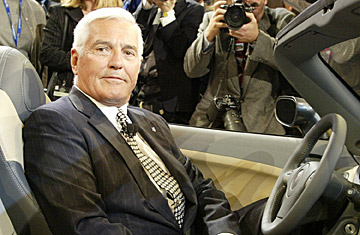
Former vice chairman of the Chrysler Corporation, Bob Lutz
(9 of 11)
DARLA MOORE: Yeah, we were talking earlier about some of the greatest stabilizing forces in the United States that other nations don't share with us, that sets us apart, is the ability here early on to have access to capital by common man to buy a home, to buy a house — mortgage financing — and what that has done for the stability of this country.
Who was it that said, "Any man who has a home is not a communist"?
WALTER ISAACSON: Yeah.
DARLA MOORE: Isn't that the comment?
NORMAN PEARLSTINE: I think, coming back to retail, Coca-Cola is an extraordinary story of the century. And ????Woodrow certainly in the beginning, ????Goisweda [sp] toward the end of the century.
When you thing that this idea of colored water with sugar is enabled to be built into the most recognizable of global brands and in the process creating extraordinary value for millions of American shareholders and extraordinary pleasure for millions of consumers around the world, I put it in a different league from Wal-mart, from McDonalds and—
GERALDINE LAYBOURNE: Isn't that really an advertising story not so much a retailing story?
NORMAN PEARLSTINE: I think it's— they make everything work right.
ROBERT A. LUTZ: It's not retail.
NORMAN PEARLSTINE: If you look at the Coca-Cola Company today it's got the strongest CFOs of any company I know in America. It's been brilliantly managed ever since ????Goisweda came in after J. Paul Austin.
They built on an extraordinary franchise that was given to them but it's not just advertising at all. By that argument Pepsi would be a closer competitor.
ROBERT A. LUTZ: But it's not retailing. I mean—
NORMAN PEARLSTINE: Correct.
ROBERT A. LUTZ: It's not retailing.
NORMAN PEARLSTINE: It's not.
ROBERT A. LUTZ: It's brand building. And so in that it's like well known shampoos, cosmetics or toothpaste, and you— if you like Coca-Cola, you'd have to— you'd have to say, "Well, Procter and Gamble is right up there, too."
But, if we stick to the retailing category, it is— well, nobody the Kresge family who kind of invented the whole concept and I think Sam Walton arguably came later and maybe did it better. But the whole— the whole area of these— getting away from the individualized mom-and-pop category-specific stores of— you had to go to the bakery, then you had to go to the vegetable market, then you had to go to the butcher, then you had to go to cobbler.
The idea of having all of this laid out in one large place and then expanding into a nationwide chain— that is— that was uniquely American, developed to a high state of the art in this country—
WALTER ISAACSON: Making Sam Walton in your mind?
ROBERT A. LUTZ: Sam Walton, Kresge, who— I could go for Kresge as well, but certainly Sam Walton stands as a giant in that industry.
WALTER ISAACSON: Good or bad thing, Wal-marts? For American business and retailing.
ROBERT A. LUTZ: Well, it's like all other things, you can— you can either bemoan the demise of the small individualized shopkeeper, like the Blockbusters blowing away the corner video store, but that's capitalism. It's social Darwinism. The efficient will destroy the less efficient.
And, if we try to get away from that, we're gonna— we're gonna mess up this multi-geared that's running so well for us.
WALTER ISAACSON: Darla?
DARLA MOORE: No, I certain agree with that.
The one thing I would add we haven't talked about at all, and maybe it's not something to spend a lot of time on.
I keep going back to the cobbling together of the system that we have. We are a profit-motivated— a production-oriented people. But to have taken us where— in the 19th century we were capitalism, and where we have gone in the 20th century to be able to manage these global, massive corporations with hundreds and hundreds of thousands of people working in it and to be able to do it in an efficient manner. I think one thing we overlook and we don't talk about that is a centerpiece to the system, and that is what we have in here in business education.
And I think we underestimate what that has done to foster the highly developed system that we have. And I would put on the list Charles Elliot, who was the president of Harvard at the time, then he talked the board into starting the Harvard Business School around 1910 or whenever.
And it's from there that we have minted this army— this army of capitalists. And all the other schools that were started subsequent. An incredible wealth of education in this country on how to run a business.
So, we got bench strength so the people like Bill Gates can build a Microsoft and Jack Welch can build a GE 'cause of that bench strength of education in this country. That's unique to us.
GERALDINE LAYBOURNE: I think that's the thing that worries me most about America—
DARLA MOORE: Is how educated we are in business?
GERALDINE LAYBOURNE: Yes.
DARLA MOORE: This may be too much.
GERALDINE LAYBOURNE: I think that, you know, what's missing is the passionate amateur. I think, if you look at any people on this list, the people who have really built stuff didn't go to business school—
DARLA MOORE: Well—
GERALDINE LAYBOURNE: They came at it from a very heretical point of view, really crazy ideas.
